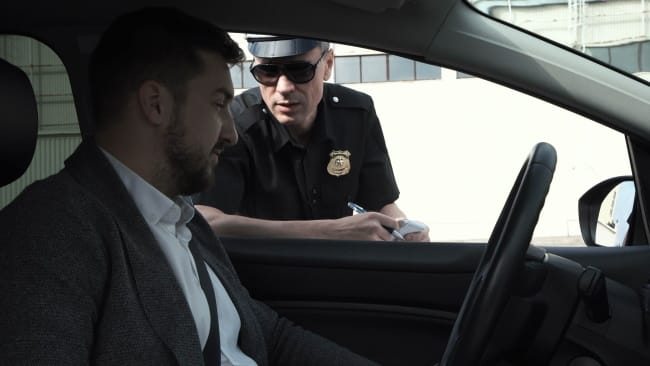Should You Allow The Police To Search Your Car?
Being pulled over by the cops is enough to make anyone panic. As you carefully follow the officer’s instructions with your hands gripping tightly to the wheel, you hope every aspect of the vehicle is up to full legal standards.
The officer checks your license and insurance information. Then, in a commanding tone, you are asked if the officer can search your vehicle. That’s a surprise! Can you say “no”? Should you say “yes”? What are the laws that deal with this very interaction?
Let’s find out!

Should You Agree To Let Police Search Your Car?
Short answer — NO!
You have a constitutional right that protects you from this very thing and the whole reason the officer is asking you in the first place. The Fourth Amendment protects citizens from any unlawful search from government agencies and this includes the search of vehicles. Even if the officer has a good reason to pull you over, this doesn’t mean they have a right to search the vehicle.
If the officer has no reason to believe you are carrying a weapon or any other controlled substances or items, they have no legal basis to search your vehicle.
What do you say? — Warrantless Searches
Politely and respectfully respond to the officer by saying: “I don’t consent to warrantless searches.”
Despite your lack of consent, the officer may find a reason to search your car anyway. In the light of extenuating circumstances, the officer may search the vehicle anyway.
Unfortunately, numerous reasons will permit an officer to go ahead and search your vehicle anyway. For example, many laws in various states permit officers to detain drivers for minor traffic offenses, such as driving without a seat belt, speeding, changing lanes without signaling, etc.
If the officer is interested in searching the vehicle, they will not usually take the time to go and obtain a warrant, they will simply charge you for the slightest infraction — and there are many to select from— and then take all the time they like to search your car.
How can they do this?
In Plain View – Searching Your Car
Colorado’s Plain View Doctrine is a rule of criminal procedure that provides an exception to the Fourth Amendment in some situations. This allows an officer to collect evidence, for example, at the scene of a traffic stop, if the evidence is easily visible. It is also called the clear-view doctrine.
So, if an officer sees beer cans on the floor of the car, a pipe and/or smoking paraphernalia on the dashboard, or even smells the aroma of marijuana on you or in the car, they have the right to search the vehicle.
Even if the officer has not made an arrest – if they have pulled you over because they suspect you of a possible infraction, they can look for any possible reason to search the car. If they were to frisk the driver, they may find contraband and this will allow them to search the vehicle on probable cause.
Understanding Probable Cause
To take any sort of action, the officer needs probable cause. If they want to make an arrest, search property or vehicles, or obtain an arrest warrant, the officer will first have to find specific circumstances, evidence, or observations that would give any reasonably minded individual reason to believe that the person has committed or is in the process of committing an infraction.
Even if the person or vehicle has been stopped by the police, this doesn’t necessarily mean that the officer has a right to search the vehicle, a person, or their property without probable cause and a warrant permitting the search.
An officer is only bound to meet the most minimal standards in most cases and this is not very difficult to do. Proving that an officer had no probable cause to search a vehicle is almost impossible and has been successfully achieved in only a few rare situations.
Can You Challenge Probable Cause?
The police officer may ask you for some documentation such as your driver’s license, insurance card or they can order you out of the vehicle. But if you have the utmost confidence that there is absolutely no reason the officer should be searching your vehicle, you can enact your rights.
Remember, the officer has no reason to search your vehicle, your person, or your property without a warrant to do so or probable cause. Furthermore, the officer has no legal right to inquire about your immigration status.
If you have been pulled over and provided the officer with the information requested, you have the right to ask the officer if you can leave so long as they have no intention of making an arrest. If the officer has nothing in their view to provide probable cause, has no warrant, and has no intention of making an arrest, you can respectfully ask to be allowed to leave.
If you find yourself in a situation where a simple traffic stop has turned into something much more serious, Give The Law Office Of Jeremy Loew a call – now!
We’ll review your case, no charge, and will advise you on the best way to preserve your rights and how to mitigate the situation.
NEED LEGAL HELP?
Contact Us for a Free Consultation!
NEED LEGAL HELP?
Contact Us for a Free Consultation!

 Out of a field of approximately 1,100 attorneys surveyed,
Out of a field of approximately 1,100 attorneys surveyed,